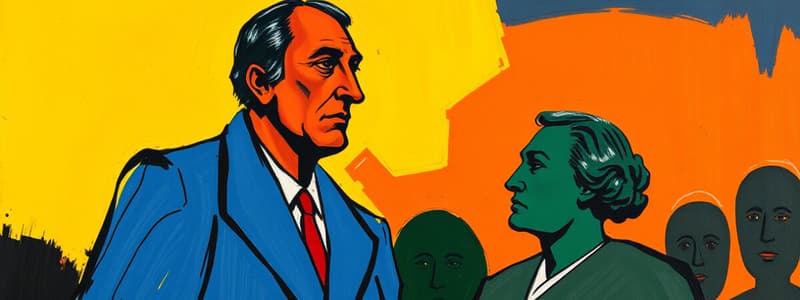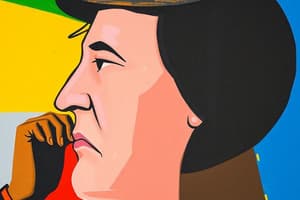Podcast
Questions and Answers
What does the First Amendment to the U.S. Constitution protect?
What does the First Amendment to the U.S. Constitution protect?
The freedom of speech.
The First Amendment is absolute and cannot be limited by the government.
The First Amendment is absolute and cannot be limited by the government.
False (B)
What crime did the Espionage Act make regarding military actions?
What crime did the Espionage Act make regarding military actions?
To cause insubordination, disloyalty, mutiny, refusal of duty, or to obstruct military recruiting.
What did Schenck argue conscription was a form of?
What did Schenck argue conscription was a form of?
Match the following arguments to their respective sides in Schenck v. United States:
Match the following arguments to their respective sides in Schenck v. United States:
What was the Supreme Court's decision in Schenck v. United States?
What was the Supreme Court's decision in Schenck v. United States?
Schenck was convicted of violating the __________ Act.
Schenck was convicted of violating the __________ Act.
Schenck was expressing opinions about government actions and policies.
Schenck was expressing opinions about government actions and policies.
Which section of the Espionage Act outlines punishments for obstructing military recruitment?
Which section of the Espionage Act outlines punishments for obstructing military recruitment?
Flashcards are hidden until you start studying
Study Notes
Background
- First Amendment protects freedom of speech but is not absolute; reasonable limits can be imposed by the government.
- Government maintains limited control over speech content.
- Espionage Act of 1917 criminalized actions that undermine military efforts, including insubordination and obstructing recruiting.
- Supreme Court was tasked with determining if Schenck's punished speech was protected by the First Amendment.
Facts
- Schenck printed and distributed 15,000 fliers urging draft-age men to resist conscription, claiming it was unconstitutional.
- He argued conscription equated to "involuntary servitude," violating the 13th Amendment.
- Schenck promoted the exercise of rights like free speech and peaceful assembly.
- After his 1917 conviction, he sought a retrial, which was denied. The Supreme Court agreed to review his case in 1919.
Issue
- Central question focused on whether Schenck’s conviction under the Espionage Act for expressing dissent against the draft violated his First Amendment rights.
Constitutional Provisions and Federal Statutes
- The relevant legal frameworks include the First Amendment to the U.S. Constitution and Section 3 of the Espionage Act.
Espionage Act, Section 3
- Defined punishable actions during wartime, including causing military insubordination, disloyalty, or obstructing recruitment.
- Penalties included fines up to $10,000 and imprisonment for up to twenty years.
Arguments for Schenck
- First Amendment should protect speakers from punishment for their expressions.
- Essential for free discussion on public matters; Schenck shared views on government actions.
- Persuasion to avoid military service was within the bounds of protected speech.
- Encouraged citizens to address grievances through their Congressional representatives rather than promoting lawbreaking.
Arguments for the United States
- Wartime conditions necessitate limitations on expression to ensure military and governmental efficacy.
- Schenck aimed to dissuade enlistment, demonstrating intent to violate the Espionage Act.
- Government must have enhanced authority to safeguard national security, potentially limiting specific types of speech.
Decision
- The Supreme Court rendered a unanimous decision affirming the United States’ position.
- The First Amendment can prevent punishment only under certain conditions; speech that poses a "clear and present danger" of causing harm is not protected.
Studying That Suits You
Use AI to generate personalized quizzes and flashcards to suit your learning preferences.




